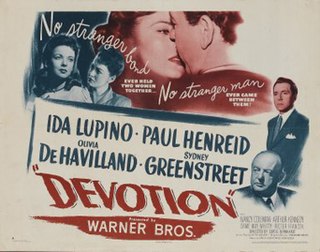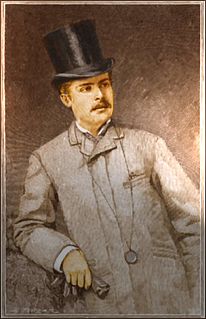
Lady Audley's Secret is a sensation novel by Mary Elizabeth Braddon published in 1862. It was Braddon's most successful and well-known novel. Critic John Sutherland (1989) described the work as "the most sensationally successful of all the sensation novels". The plot centres on "accidental bigamy" which was in literary fashion in the early 1860s. The plot was summarised by literary critic Elaine Showalter (1982): "Braddon's bigamous heroine deserts her child, pushes husband number one down a well, thinks about poisoning husband number two and sets fire to a hotel in which her other male acquaintances are residing". Elements of the novel mirror themes of the real-life Constance Kent case of June 1860 which gripped the nation for years. A follow-up novel, Aurora Floyd, appeared in 1863. Braddon set the story in Ingatestone Hall, Essex, inspired by a visit there. There have been three silent film adaptations, one UK television version in 2000, and three minor stage adaptations.

Busman's Honeymoon is a 1937 novel by Dorothy L. Sayers, her eleventh and last featuring Lord Peter Wimsey, and her fourth and last to feature Harriet Vane.

Florodora is an Edwardian musical comedy. After its long run in London, it became one of the first successful Broadway musicals of the 20th century. The book was written by Jimmy Davis under the pseudonym Owen Hall, the music was by Leslie Stuart with additional songs by Paul Rubens, and the lyrics were by Edward Boyd-Jones, George Arthurs and Rubens.

On the Town is a musical with music by Leonard Bernstein and book and lyrics by Betty Comden and Adolph Green, based on Jerome Robbins' idea for his 1944 ballet Fancy Free, which he had set to Bernstein's music. The musical introduced several popular and classic songs, among them "New York, New York", "Lonely Town", "I Can Cook, Too", and "Some Other Time". The story concerns three American sailors on a 24-hour shore leave in New York City during World War II, 1944. Each of the three sailors meets and quickly connects with a woman.

Me and My Girl is a musical with music by Noel Gay and its original book and lyrics by Douglas Furber and L. Arthur Rose. The musical is set in the late 1930s and tells the story of an unapologetically unrefined cockney gentleman named Bill Snibson, who learns that he is the 14th heir to the Earl of Hareford. The action is set in Hampshire, Mayfair, and Lambeth.

Evelina, or the History of a Young Lady's Entrance into the World is a novel written by English author Fanny Burney and first published in 1778. Although published anonymously, its authorship was revealed by the poet George Huddesford in what Burney called a "vile poem".

A Woman of No Importance by Oscar Wilde is "a new and original play of modern life", in four acts, first given on 19 April 1893 at the Haymarket Theatre, London. Like Wilde's other society plays, it satirises English upper-class society. It has been revived from time to time since his death in 1900, but has been widely regarded as the least successful of his four drawing room plays.

Captain Brassbound's Conversion (1900) is a play by G. Bernard Shaw. It was published in Shaw's 1901 collection Three Plays for Puritans. The first American production of the play starred Ellen Terry in 1907. The play explores the relationship between the law, justice, revenge and forgiveness.

Eleanor Audley was an American actress with a distinctive voice and a diverse body of work. Audley was best known for her roles as aristocratic, somewhat villainous matrons. She played Oliver Douglas's mother, Eunice Douglas, on the CBS sitcom Green Acres (1965–1969), and provided Disney animated features with the voices of Lady Tremaine in Cinderella (1950); and Maleficent in Sleeping Beauty (1959). She had roles in live-action films, but was most active in radio programs such as My Favorite Husband and Father Knows Best. Audley's television appearances include those in I Love Lucy, The Dick Van Dyke Show, The Beverly Hillbillies, Mister Ed and My Three Sons.

Jekyll & Hyde is a 1990 musical loosely based on the 1886 novella The Strange Case of Dr Jekyll and Mr Hyde by Robert Louis Stevenson. Originally conceived for the stage by Frank Wildhorn and Steve Cuden, it features music by Frank Wildhorn, a book by Leslie Bricusse and lyrics by all of them. After a world premiere run in Houston, Texas, the musical embarked on a national tour of the United States prior to its Broadway debut in 1997. Many international productions in various languages have since been staged including two subsequent North American tours, two tours in the United Kingdom, a concert version, a revamped US tour in 2012, a 2013 Broadway revival featuring Constantine Maroulis, and an Australian concert version in 2019.

Monsieur Beaucaire is a romantic opera in three acts, composed by André Messager. The libretto, based on the 1900 novel by Booth Tarkington, is by Frederick Lonsdale, with lyrics by Adrian Ross. The piece premiered at the Prince of Wales Theatre in Birmingham, England, on 7 April 1919, before opening at the Prince's Theatre in London under the management of Frank Curzon on 19 April 1919 and transferring to the Palace Theatre on 29 July 1919, for a successful run.

Devotion is a 1946 American biographical film directed by Curtis Bernhardt and starring Ida Lupino, Paul Henreid, Olivia de Havilland, and Sydney Greenstreet. Based on a story by Theodore Reeves, the film is a highly fictionalized account of the lives of the Brontë sisters. The movie features Montagu Love's last role; he died almost three years before the film's delayed release.

Major-General Hugh Richard Dawnay, 8th Viscount Downe, was a British Army general and President of the Marylebone Cricket Club.

Oliver Burchett Clarence was an English actor.

Thomas Dunham Whitaker (1759–1821) was an English clergyman and topographer.

Katherine Julia Mackenzie was an English actress, professionally known as Katherine Compton, or, more usually, Miss Compton. She was best known for her appearances in the comedies written by her husband R. C. Carton, between 1885 and 1922.

Natalie Moorhead was an American film and stage actress of the 1920s and 1930s. She was known for distinctive platinum blond hair.

St Stephen's Church, Gloucester Road, is a Grade II* listed Anglican church located on the corner of Gloucester Road and Southwell Gardens in South Kensington, London, England.

R. C. Carton was an English actor and playwright.

Mabel Lucy Hackney was a British actress and the wife of the dramatist and actor Laurence Irving and daughter-in-law of the actor Henry Irving in whose company she acted before she joined that of her husband. She died along with her husband in the RMS Empress of Ireland disaster in 1914.




















